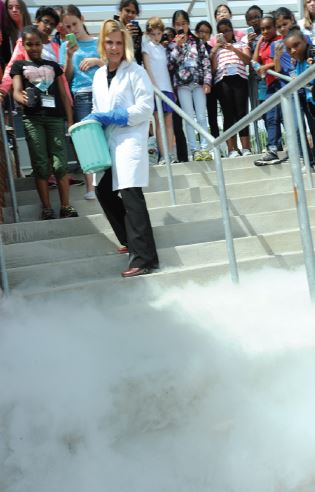Betsy Pugel - 2015 SPIE Women in Optics Planner
Physicist, Deputy to the Planetary Protection Officer, NASA Goddard Space Flight Center, Detailed to NASA Headquarters, USA
Country of Birth: USA
Educational Background: PhD, Experimental Condensed Matter Physics, University of Maryland College Park, USA
 As a detailee to the Planetary Protection Officer at NASA Headquarters, our office is responsible for ensuring that when NASA visits other planets, asteroids, moons and other bodies in the solar system, NASA takes the right steps to keep those bodies free of Earthbased organisms. It's a very conscientious job and requires critical thinking across many disciplines-physics and otherwise. My background in non-destructive evaluation and detectors has been quite useful-from both the hardware development side (what can be sterilized prior to launch) to what could be measured by the scientific instruments aboard a given payload. It requires a deep cultural sensitivity as well, since we work internationally in addition to with NASA missions. Prior to this, I've enjoyed many different roles at NASA, including working on scientific instruments at a wide range of levels-it has all been an adventure and growth experience!
As a detailee to the Planetary Protection Officer at NASA Headquarters, our office is responsible for ensuring that when NASA visits other planets, asteroids, moons and other bodies in the solar system, NASA takes the right steps to keep those bodies free of Earthbased organisms. It's a very conscientious job and requires critical thinking across many disciplines-physics and otherwise. My background in non-destructive evaluation and detectors has been quite useful-from both the hardware development side (what can be sterilized prior to launch) to what could be measured by the scientific instruments aboard a given payload. It requires a deep cultural sensitivity as well, since we work internationally in addition to with NASA missions. Prior to this, I've enjoyed many different roles at NASA, including working on scientific instruments at a wide range of levels-it has all been an adventure and growth experience!
Being underestimated can be an advantage. When I was an undergrad, people thought differently of me because I am outgoing and like people. They thought that I could not be serious about physics. It was a really curious kind of logic. It used to frustrate me until I learned that it is an advantage to be underestimated-that people are much more open as a consequence. I am a patient person, so I learned to let reality play itself out versus spend time challenging someone's preconceived notions of what a physicist "should" look like.
Be patient and be willing to work hard for your dreams. It can sometimes take a while in whatever stage of life you're in for something to work out, so be willing to be patient and stick it out through the tough times, knowing that good times will eventually come if you keep at it.
Accept imperfection. There will be people who understand you and people who don't. There will be good and bad times in your career. Let all the things that you call "negative" be a teacher to you-ask: What can this experience teach me? What can I learn from this?